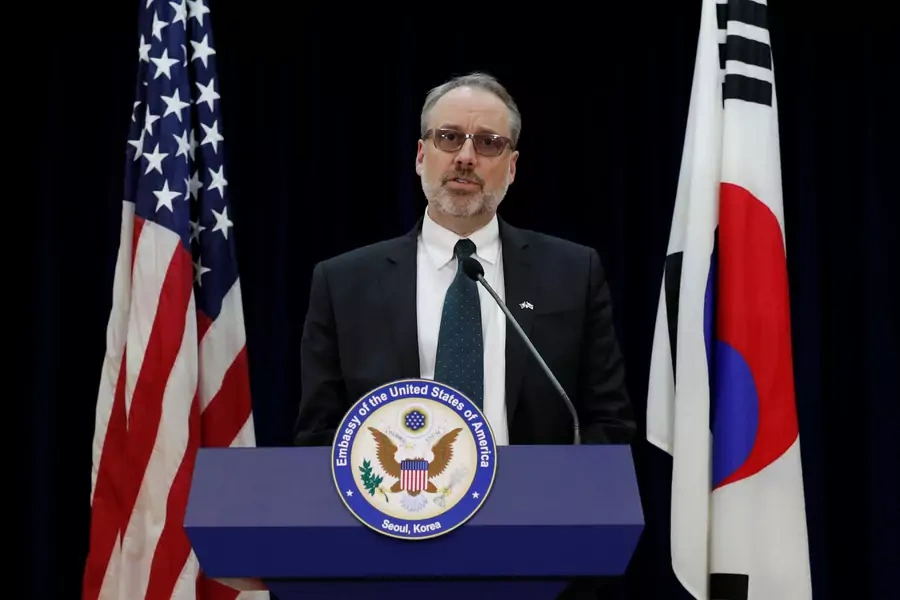The United States and South Korea Are Unprepared for Real Burden-Sharing Negotiations

This post is authored by Hwang Joonkook, former ROK ambassador to the United Kingdom. It is part of a project conducted by the program on U.S.-Korea policy at the Council on Foreign Relations, supported by the Smith Richardson Foundation and Korea Foundation. This series of posts will address the transition of operational control (OPCON) on the Korean Peninsula. To further stimulate an open discussion of these issues, we would like to invite reader responses. Please contact Ellen Swicord at [email protected] for submission guidelines if you are interested in contributing a response.
Problems with Current Burden-Sharing Negotiations
Although the United States and Republic of Korea (ROK) have made a little progress on Special Measures Agreement (SMA) negotiations, both appear unprepared for real negotiations. The basic positions of the two countries remain quite different: the United States wants a negotiated agreement to reflect the total costs associated with ROK defense beyond the existing SMA, including transportation, training, and equipment for United States Forces Korea (USFK), while the ROK seeks to retain the current SMA framework that deals with only three categories: labor costs for Korean workers in USFK, logistics costs, and construction for USFK.
More on:
The United States points out that a broad set of costs are not captured within the current SMA, including all rotations of U.S. military personnel to the peninsula and temporary deployments, who each must be trained, equipped, and transported between the United States, South Korea, and elsewhere in Asia.
The ROK position has gone over well with domestic audiences, but is almost a non-starter for ‘real’ negotiations. The confusing U.S. presentation of its position is equally problematic. In December 2019 the U.S. chief negotiator said publicly in Seoul that, “As parties to the agreement, we can change the agreement if we agree to do it together. So, the SMA agreement has been updated and changed through the years.” This explanation, along with the U.S. characterization of its stance as seeking an extension of the previous SMA, is misleading because “SMA” is not just an abbreviation for "Special Measures Agreement," but for the Special Measures Agreement relating to Article 5 of the Facilities and Areas and the Status of United States Armed Forces in Korea (SOFA) agreement. Article 5 of SOFA deals only with “facilities and areas” for USFK. The U.S. explanation of its position disregards the fact that in order to seek costs beyond “facilities and areas,” such as training, equipment, and transportation, the United States would need to acknowledge that the current negotiations are inconsistent with the original spirit of the SMA. This discrepancy gives the ROK government maneuvering room in legal and procedural matters related to burden-sharing negotiations.
The United States should be more straightforward and clearly assert that ‘new’ U.S. demands require a negotiating track separate from the existing SMA discussions and necessitate a ‘new political decision’ by the ROK government. Furthermore, the United States should bear in mind that the U.S.-ROK ‘total sum-based’ SMA arrangement (often posited against the U.S.-Japan ‘need-based arrangement’) has long been criticized as lacking transparency in the National Assembly ratification process and has been taken advantage of by leftist radical groups to fuel anti-American sentiment in Korea. Because it demands ‘new’ items beyond the three existing SMA categories, the United States should move away from past practices of negotiating a total sum without submitting a detailed statement or breakdown of costs. The U.S. government should also be more reasonable and flexible in considering the transition to a ‘need-based arrangement.’
The ROK should also be more resilient and compromise on the creation of new categories outside of the current SMA framework. In the thirty years since the first U.S.-ROK SMA, everything has changed, including U.S. relative power, the ROK economy, and the situation on the Korean Peninsula. A Korean proverb says, “Even mountains and rivers change in ten years.” There is no convincing logic in maintaining that the SMA cannot change. The ROK bottom line should be that it is willing to accept ‘reasonable’ cost-sharing if new categories properly relate to ROK defense.
Both parties should remember that this is a negotiation between allies, not competitors. In this context, two things in particular should be avoided: brinkmanship and a zero-sum mentality. The ROK government should be mindful that using brinkmanship tactics for alliance matters is risky. The U.S. government should be more prudent and not apply a zero-sum mentality to money-related negotiations. In this regard, the U.S. chief negotiator’s comment: “So for me that is the most important question: What reduces the burden to our taxpayer?” was inappropriate.
More on:
Implications for the Alliance
Exorbitant U.S. demands for increased ROK contributions to mutual defense at an unusual time of national division over the ROK’s diplomatic orientation intensify and embolden anti-American and pro-North Korea/China elements in South Korea. This represents a nightmare scenario for Korean conservatives, who are struggling to sustain a strong U.S.-ROK alliance in these challenging times.
America’s image and reputation in South Korea are vital in the context of U.S.-China strategic competition surrounding the Korean Peninsula. U.S.-China competition is quite different from U.S.-Soviet confrontation, and the United States should manage its reputation more skillfully.
A review of the U.S.-ROK alliance is now underway among Korean pundits and opinion leaders amid North Korean nuclear and missile advancement, decreasing credibility of U.S. nuclear umbrella, and growing U.S. demands for financial contributions from allies and partners. The present circumstances have triggered debate in South Korea over how to reduce dependence on the United States and whether and how to engineer its own nuclear armament. The transition of operational control on the peninsula and INF Treaty developments make this debate both more relevant and more complex.
2020 may prove to be a critical year for the U.S.-ROK alliance.
 Online Store
Online Store